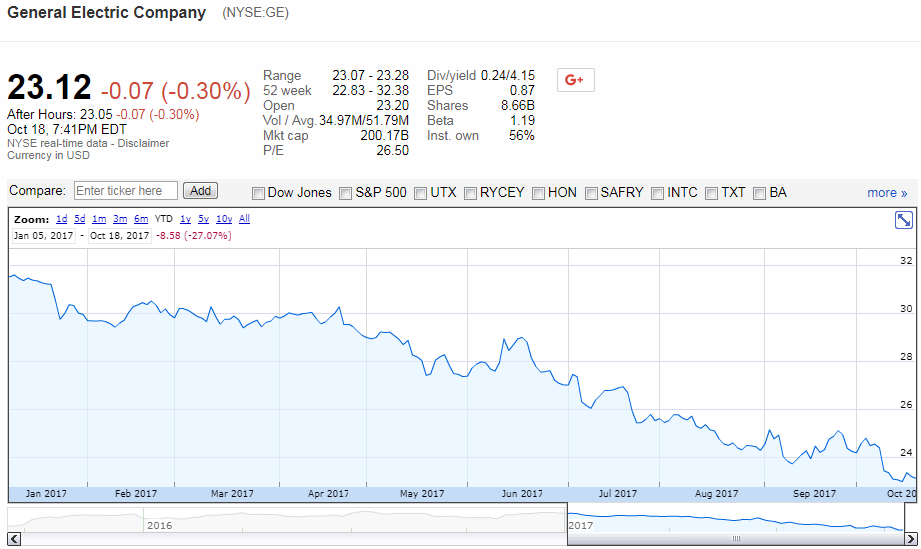How Much Can One Company Affect The S&P 500's Dividends?
2017 hasn't been a good year for General Electric (NYSE: GE), and now, the company's new CEO, John Flannery, who took over from Jeffrey Immelt in August 2017, is shaking up the company as its financial problems are reaching a crisis point, all while its stock price continues its 2017 trend of descent.
(Click on image to enlarge)

That much is evident from the just-announced departure of the company's new Chief Financial Officer, Jeff Bornstein, who had just moved into the CFO position at the same time Flannery was elevated to be GE's Chief Executive Officer. The unexpected change points to ongoing issues with the company's financial situation, which appears to be deteriorating.
GE's management has been over-promising and under-delivering, and you only have to look at the nearly 27% decline in the company's stock price this year to see the impact. GE hasn't formally abandoned its EPS targets for this year and the next, but the commentary around those targets has grown increasingly negative. Moreover, there are signs of deteriorating quality of earnings. Consider:
- GE significantly missed its own expectations for cash flow generation by $1 billion in the first quarter.
- On the second-quarter earnings call, Bornstein guided investors toward the bottom end of the full-year earnings and cash flow guidance ranges.
- Immelt's long-held target of $2 in operating EPS in 2018 is significantly above the analyst consensus of $1.63.
In a nutshell, market analysts believe that GE isn't going to make its earnings numbers, and what's more, they also believe that GE's cash flow is in trouble.
... when GE reported a cash flow shortfall of $1 billion in the first quarter--with $300 million of it from contract assets--it highlighted the fact that GE has been booking revenue and earnings which haven't been dropping through into cash flow as yet.
The combination of lackluster earnings and strained cash flow means that the company will likely be forced to cut its dividend. As a general rule, companies need at least one of these two things working in their favor in order to sustain their dividends without negatively impacting their other operations and costs, but since GE has neither of these going for it at this time, there is a very real possibility that the company will be compelled to slash its dividend in the very near future as part of an overall restructuring initiative. As in today or tomorrow, with a potential 25% cut from the current quarterly dividend payout of $0.24 per share down to $0.18 per share....
Since GE is one of the largest company's in the U.S., at least as measured by its market capitalization, what happens to GE will have a noticeable effect on major stock market indices like the S&P 500 (Index: SPX). Because we use the future expectations associated with the index' dividends per share to project its future trajectory, we wondered how much GE cutting its dividend might affect those future expectations.
Disclosure: None.



